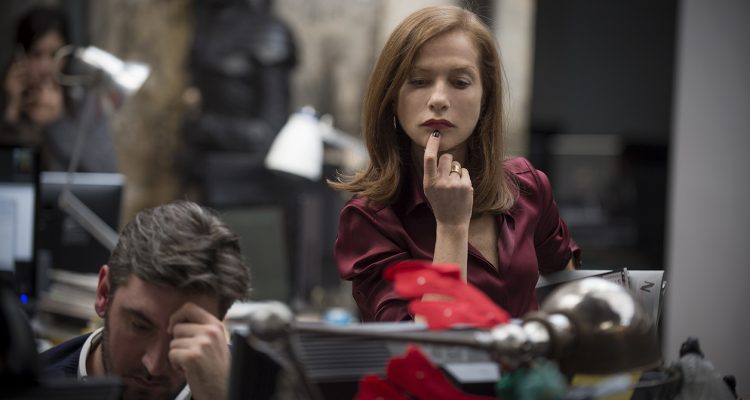This is a reprint of our review from the 2016 Cannes Film Festival.
You just can’t do what Paul Verhoeven just did with “Elle“: it’s just not done. His first feature film in a decade, it’s a comedy about rape, a psychological thriller about impossible psychology, and a perverse comment on female sexuality and patriarchy that comes from a male writer (David Birke) and a male director — the list of the film’s transgressions against the culturally acceptable is almost gratuitously long. But the spine of self-aware intelligence that runs through even its most grotesque, exploitative, and offensive twists, and the basically incredible, irreplaceable central performance from Isabelle Huppert, make this queasily hilarious mass of contradictions just about cohere. If our modern age is partially defined by outrage culture, trigger warnings, and sensitivity training seminars (all of which have their function) the glee with which Verhoeven and Huppert openly, even playfully, defy any concession to cultural correctness is breathtaking. The cinema of the #problematic may have just found its “Citizen Kane.”
The minimalist opening credits are set to the strings of Anne Dudley‘s intrigue-toned score — one heavily indebted to the erotic thrillers of the ’80s and ’90s of which Verhoeven made the most indelible with “Basic Instinct.” But just as the director’s name begins to fade down, glass shatters and the sounds of a violent scuffle mingle with a woman’s muffled cries, a man’s brutish grunts. The scene cuts in as a masked intruder thrusts on top of a dazed woman in an upscale French dining room, then zips himself up and flees the scene, leaving her prone and bleeding. In case we had forgotten the visceral energy that Verhoeven always brings to scenes of violence, it’s two minutes into the movie, and he’s already proven that he hasn’t. But as devastating as the scene seems, the woman, Michele (Huppert), calmly cleans up the mess, has a bath and makes dinner for her grown-up son Vincent (Jonas Bloquet), grouching at him about his pregnant girlfriend and resignedly lending him money. Later, she will flash back to the rape a couple of times (giving Verhoeven the excuse to slap us around with that scene in greater detail), but she tells no one, until a dinner with friends and her ex-husband some days after.

There is so much more going on in Verhoeven’s massively complex genre thriller than the story of a rape and its victim — possibly because its victim seems like the least victimized person ever to stalk the earth. Michelle is a rich and successful businesswoman, who runs a gaming design company. Just the day after the assault we see her sitting in a screening room surrounded by the geeky, all-male twentysomethings who are her programmers and complaining that “the orgasmic convulsions are too timid” in the footage she’s just seen, in which a giant troll sprouts tentacles that impale a big-bosomed warrior woman. She is having an empty-headed affair with her friend and business partner’s husband Robert (Christian Berkel), fencing workplace conflicts, negotiating her prickly relationship with her heavily botoxed mother, who is dating a much younger man, and growing increasingly attracted to her married Christian banker neighbor Patrick (Laurent Lafitte). And she is also, we discover, the child of a notorious serial killer, currently serving out his life in prison. Michelle is essentially a one-woman Gothic melodrama, or rather she would be if she wasn’t so damn funny.
READ MORE: 12 Films To See In November
It’s Verhoeven’s most discomfiting gift that he can make you laugh at all the wrong things, but the comedy of manners which is part of the the film’s package, as well as its sheen of social satire, gives rise to some truly audacious edits from dark to light. In fact, the corkscrew plot of “Elle” so constantly switches up and reverses back on itself, that over its slightly overlong 2 hours and 10 minute length, it has enough time to twist itself into clarity, decency and good taste repeatedly, only to immediately twist right out.

Does it trivialize rape? Yes, sometimes, the way it trivializes everything — sex, death, parenthood, workplace dynamics, the gender divide. But while later on the contortions of Michele’s psychology regarding the rape and her rapist may strain credibility to a breaking point (it is pretty much miraculous that Huppert can make her seem like a real woman, let alone deliver her with such lightness, such wit, such bright, disingenuous eyes) perhaps the more gently transgressive point the film makes earlier is the more lastingly provocative. And it is simply that the rape that Michele experiences, though it affects her sexuality later, never defines her — perhaps because she’s kind of a sociopath herself, or perhaps because (deep breath) it is not that big a deal to her. Does the film lessen the gravity of the offense of rape by suggesting there are women who compartmentalize and then recover from it, or does it increase one’s admiration for the women who do? And when did we last have to ask these kinds of questions of a genre thriller? Oh yes, probably more than ten years ago, when Paul Verhoeven was last active.
For all its packed agenda, fearless depravity and overt controversy-baiting (it is maybe the most surprisingly un-booed title of Cannes 2016), this is still a genre film — and a very entertaining one at that — it’s just had the training wheels of taste and acceptability removed. And with it Verhoeven, the cinematic mischief maker of the late-20th century anoints himself the trickster God of the early 21st. But what moral sense you can make of it is largely a coin-toss: “Elle” is a film whose best and worst instincts are constantly at war with each other, like a bickering couple trapped in an escalating argument from which neither will back down and in which both desperately want to have the last word. [B+]

